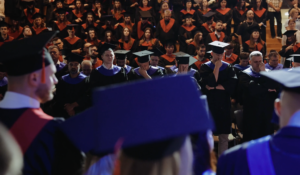
WASHINGTON (BP)–The Good News Club is going to the Supreme Court. And the outcome could have far-reaching implications for how we apply the First Amendment in public schools.
The case involves the refusal of a New York school district to allow a Christian youth group — the Good News Club — to use school facilities after school hours. Although the district allows a variety of other community groups (such as the Boy Scouts and the 4-H Club) to use the school, it doesn’t allow groups that offer religious instruction or worship.
This controversy isn’t confined to New York. Similar conflicts and lawsuits are popping up all over the country. In just the past few weeks, the First Amendment Center has received calls from parents in Alabama, Tennessee and Washington state about the resistance of school officials to the Good News Club.
You might have thought this problem was settled in 1993. That was the year a unanimous Supreme Court ruled in Lamb’s Chapel v. Center Moriches Union Free School District that public schools making their facilities available to community groups during non-school hours may not discriminate on the basis of religious viewpoint.
Lamb’s Chapel grew out of a church group’s request to use school facilities after hours for showings of religious films on family issues. The Supreme Court held in the case that school districts have the right to ban all after-hours use of school facilities, but if a district does grant access to various community groups, then it can’t discriminate against others because they have a religious viewpoint.
So why are school districts refusing to allow the Good News Club to meet in school buildings? Because, the argument goes, these clubs don’t just offer religious views on morality and other subjects; they offer religious worship and instruction. In other words, public schools may not ban groups with religious viewpoints, but they may ban groups whose programs include religious content, such as worship.
If you find this distinction confusing (or meaningless), you’re not alone. How else would a religious club teach morality, for example, except through religious practice and instruction?
Even if we could clearly define the difference between viewpoint discrimination and content discrimination, do we really want the courts to decide where “religious viewpoints” end and “religious instruction or worship” begins? That’s exactly the kind of church-state entanglement the First Amendment is supposed to prevent.
Many school officials who object to allowing the Good News Club might change their mind if the club were to meet at a later time, say 5 or 6 p.m. These officials worry that allowing an evangelical group aimed at students to meet right after school gives the appearance of school endorsement of religion. Moreover, if the meetings are at 3 p.m., some kids may feel pressured by peers or even outside adults to attend.
Both of these potential problems could be addressed by asking all community groups to start their meetings at least 30 minutes after the last bell. That gives students who are going home time to leave and separates outside activities from the school day. It’s also important that all outside groups using the school building require parental permission of minors attending the meetings.
How will the Supreme Court deal with this issue? It’s difficult to predict. Thus far, the 2nd U.S. Circuit Court of Appeals has upheld the New York school’s policy excluding the Good News Club. But in an earlier case out of Missouri, the 8th U.S. Circuit Court of Appeals went the other way, ruling that excluding the Good News Club while allowing other groups violated the club’s constitutional right of free speech.
The high court should clear up this confusion by applying to this case the principle of equal treatment articulated in Lamb’s Chapel. Simply put, if a school district allows some youth groups access to school facilities, it should not be able to discriminate against others on the basis of religious viewpoints or content. To do so is unworkable, unjust and unconstitutional.
–30–
Haynes is senior scholar/religious freedom programs with the First Amendment Center’s office in Arlington, Va. Your questions and comments are welcome. Write to Charles Haynes at the First Amendment Center, 1207 18th Ave. S., Nashville, Tenn. 37212. E-mail address: [email protected].










